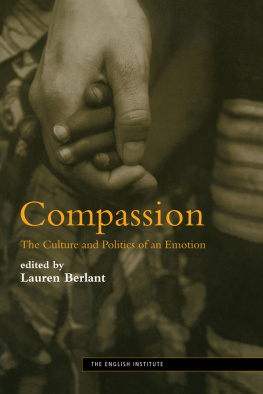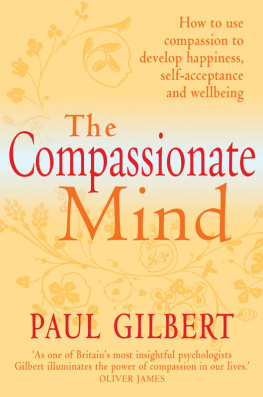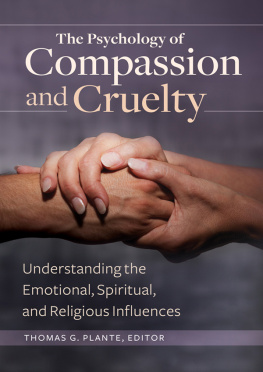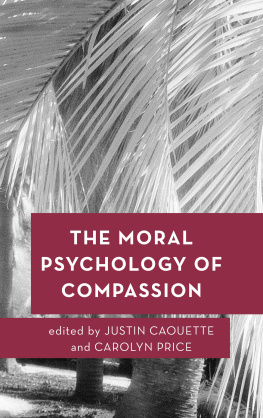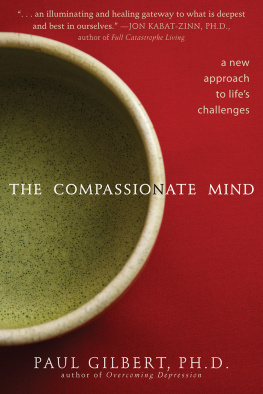1
Compassion
MARJORIE GARBER
Either out of humility or out of selfrespect (one or the other) the Court should decline to answer this incredibly difficult and incredibly silly question, Justice Antonin Scalia responded to the issues posed by PGA Tour Inc. v. Martin , a case of a professional golfers fight for permission to ride in a golf cart while competing on the PGA tour. Comparing the majoritys decision to grant Martins request to mistyeyed judicial supervision, Justice Scalias acerbic dissent began: In my view todays opinion exercises a benevolent compassion that the law does not place it within our power to impose.
Since Justices (and their clerks) are conscious stylists, often attentive to the opening and closing phrases of their opinions, the phrase benevolent compassion caught the eye of some experienced readers. The executive editor of the nowdefunct Inside.com, Noam Cohen, a former copy editor at the New York Times , wrote to his friend and former colleague at the Times , William Safire, to inquire whether Safire did not find benevolent compassion redundant. Could there, he asked, be such a thing as malevolent compassion? Safires subsequent correspondence on the question with Justice Scalia formed the basis of a Sunday column.
Scribal joustings between such elevated wordsmiths cannot always avoid a certain archness of tone. Here is Justice Scalias response to the question, posed to him by his friend Safire, about whether he was being redundant or differentiating from some other kind of compassion:
I shall assume that such differentiation is impossiblethat compassion is always benevolentthough that may not be true. (People sometimes identify with others suffering, suffer with themtrack the Latin root of compassionnot because they particularly love the others or wish them wellto track the Latin root of benevolencebut because they shudder at the prospect of the same things happening to themselves. There, but for the grace of God, go I. This is arguably not benevolence, but selflove.)
But assuming the premise, is it redundancy to attribute to a noun a quality that it always possesses? Surely not. We speak of admirable courage (is courage ever not admirable?) [and] a cold New England winter (is a New England winter ever not cold?). It seems to me perfectly acceptable to use an adjective to emphasize one of the qualities that a noun possesses, even if it always possesses it. The writer wants to stress the coldness of the New England winter, rather than its interminable length, its gloominess, its snowiness and many other qualities that it always possesses. And that is what I was doing with benevolent compassionstressing the socialoutreach, maternalistic, googoo character of the Courts compassion.
Safire, transcribing this document with manifest readerly pleasure, here interrupts to footnote googoo, which, he says, some may mistakenly take as akin to gooey. Instead, he explains, it is short for good government, since googoo was the derisive appellation given by the New York Sun in the 1890s to local action groups calling themselves Good Government Clubs. The phrase, says Safire, is Theodore Roosevelts from the latters time as New York City police commissioner, when he railed at fellow reformers who voted independent as those prize idiots, the GooGoos.
I am willing to believe that this is the meaning of googoo, since it comes from a virtually unimpeachable source in the language business. But perhaps Safire will not mind if I also have recourse to one of his favorite tools, the Oxford English Dictionary^ where a researcher in diligent quest of googoo finds googoo, a. googoo eyes, an amorous glance, a gladeye (from goggle) and googoo, int. (echoic), to talk in the manner of a baby, but no googoo, a from Good Government clubs. I do not doubt that the robust Roosevelt, the legendary personification of everything that was not socialoutreach and maternalistic, might have thought his contemporary GooGoos were guilty of excessively benevolent idealism.
Yet Justice Scalias list of condemnatory terms for the Courts compassion fits just as well with spoony glances and baby talk as with the politics of reform. Indeed, the contiguity of maternalistic and googoo in his playful sentence suggests that he was thinking of the high chair as much as the high court. And this association of compassion with the ironically inflected maternalistic (the opposite of paternalistic, plainly regarded as a buzzword of liberalspeak) suggests where some of the judicial animus may lie; for compassion these days is a liberal word, damned with faint praise from both the right and the left. To see how this has come about, despite the high regard with which the concept of compassion is nominally held, is my objective here.
The suit on behalf of Casey Martin was brought under the Americans with Disabilities Act of 1990. Martin suffers from a rare circulatory condition in his right leg and sought to pursue his career as a professional golfer on the PGA Tour with the assistance of a cart. Justice Scalia, whose scathing dissent was joined by Justice Clarence Thomas, derided the Courts solemn duty to decide What Is Golf. The majority opinion was written by Justice Paul Stevens, who is one of the Courts two members to have shot a hole in one; the other is Justice Sandra Day OConner.
The word compassion was, perhaps inevitably, picked up and bandied about in the wake of the Courts 72 decision. Conservative columnist George Will wrote dismissively of what he called a moral theory in vogue in prestigious law schools, that one virtue trumps all competing considerations. That virtue, compassion, is a feeling that confers upon the person feeling it a duty to do whatever is necessary to ameliorate distress. Will imagined a flood of other disability suits arising from this one, like the suit against the San Francisco Ballet by a mother who charged that the ballet companys height and weight standards discriminated against her daughter. The work of compassionate courts never ends, he concluded with heavy irony.
Others had contrary views, like the veteran golfer Chi Chi Rodriguez, a star of the Senior PGA Tour. Rodriguez thought Martin was right to sue. The tour is played for charity, he noted. Its supposed to be a compassionate tour, but when it came to compassion
Who would have thought that compassion could become a twoedged sword in national debate? When George Will and Antonin Scalia both come close to ridiculing it at the very time that the president of the United States (and the leader of the Republican Party) describes himself as a compassionate conservative, something interesting is happening at the level of politicaland religiousrhetoric.
Indeed, both of our two most recent presidents have sought to associate themselves, at least rhetorically, with the concept of compassion. When George W. Bush campaigned as a compassionate conservative, the phrase seemed to convey, in its insistent and alliterating adjective, traces of an intrinsic uneasiness. What would the alternative be, one was left to wonder: A /spassionate conservative? An unfeeling conservative? A cruel conservative? Where compassionate Uberai seemed virtually pleonastic, the term compassionate conservative appeared to fend off or hold at bay intimations of oxymoron. As for Bill Clinton, his compassionate catchphraseso celebrated that it has entered the world as a seriocomic clichwas the affective, even bathetic, but consistently successful I feel your pain, an expression unsurprisingly labeled feminine by early media critics:
If other presidents tended to speak by lecturing the American public (We have nothing to fear but fear itself or Ask not what your country can do for you), Clinton often communicates by listening (I feel your pain). Call it New Age if you wish. But the Clinton style is really a textbook example of a leader who communicates in ways often more characteristic of women than men. A woman tends to say, I feel your pain. A man might say, Let me tell you why you feel pain and what you should do about it. And then he might look at his watch.

